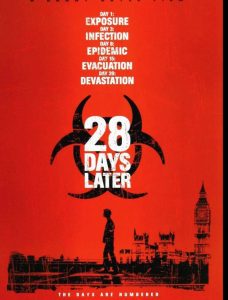
I went into this one with high expectations. First off, I’ll make it clear that I like horror movies. When the Beverly Hills audience with whom I saw this film snickered at the NASCAR ad that was the theater was running for reasons I can’t imagine, considering that not a single viewer recognized any of the cavalcade of driving-in-a-circle stars, I snickered too. We were all far too sophisticated to like fucking NASCAR. But when the crowd laughed uproariously at the preview for Freddy vs. Jason, I was marking my Calander. The even dumber horror film previewed, about a winged scarecrow who comes to life every thirty-four years and eats thirty-four, thirty-four-year-old people in thirty-four hours in thirty-four counties is something I’ll probably wind-up renting.
So, here’s a movie about super-fast, blood spitting Zombies overrunning Britain directed by Danny Boyle. Wow. Could this be both a good horror movie, and a fine piece of cinema? That’s like ice cream that clears your arteries.
28 Days Later was almost everything I expected. Derivative? Yes, thank God. What’s a zombie movie without well-armed soldiers mowing down scores of the undead? What’s a post-apocalyptic movie without a general who seems like the man to lead humanity toward survival, but turns out to be crazy? Let me put it this way. Every single thing that happens in this movie also happens in either Day of the Dead or Reign of Fire. Dozens of other movies as well, but those two alone cover it. What separates 28 Days Later is that it is actually a good movie, with good actors playing believable characters, imaginative camera work, solid dialog, compelling drama and very skilled story telling.
Now, of course the film is not perfect, either as a horror flick or as cinematic art. Its shortcoming as a horror film is simple: insufficient gore. It needs more dismemberment and exploding heads. As a film, it suffers both practical and psychological implausibility. When our core characters reach the apparent salvation of a group of soldiers, they learn that the crazy general wants the women–well, one woman and one twelve-year-old girl–to service the troops. When the women refuse, the soldiers try to rape them.
Would all but one of a group of modern, British soldiers unreservedly embrace the idea of raping a child, even after the zombie apocalypse? And, from the point of view of the older woman, is the initial demand of the general really so outrageous? Forget the kid for a minute. Suppose you’re effectively the last women on earth. A bunch of young soldiers protect and provide for you. Isn’t giving them some action the proper thing to do? I know Heloise doesn’t cover this exact situation, but if they’ve saved you from hell on earth, wouldn’t it be a nice gesture to save them from a lifetime unwanted chastity? Not that the soldiers raping the woman was justifiable, but maybe their asking wasn’t such a horrible thing.
Back to the positive attributes of the film. Primarily, it’s just a matter of overall quality and intelligence, but you can see that quality in small manifestations, like when the protagonist, Jim wakes up from a nightmare half way through the film. His friend says, “don’t worry, it’s just a bad dream.” The skillfully implied irony, hanging there for the audience, is how the statement might have been finished. “Don’t worry, it’s just a dream. All you have to worry about in reality is the fact that everyone you ever knew before is dead, you’re probably going to die and the human race will soon be extinct.”
This has extra weight because Jim woke up to the apocalypse from a coma. Added to this a bit later, is a point made by one of the soldiers when someone hopes that everything will return to normal. The extinction of the human race is a return to normalcy. We’re a blip, an aberration. The zombies don’t really change our overall situation so much as they just make it more immediate and obvious. Plus, they look and sound really cool and vomit blood!